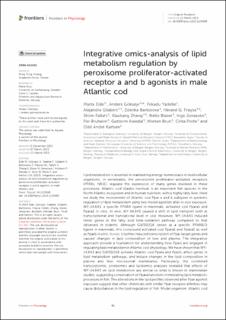| dc.description.abstract | Lipid metabolism is essential in maintaining energy homeostasis in multicellular organisms. In vertebrates, the peroxisome proliferator-activated receptors (PPARs, NR1C) regulate the expression of many genes involved in these processes. Atlantic cod (Gadus morhua) is an important fish species in the North Atlantic ecosystem and in human nutrition, with a highly fatty liver. Here we study the involvement of Atlantic cod Ppar a and b subtypes in systemic regulation of lipid metabolism using two model agonists after in vivo exposure. WY-14,643, a specific PPARA ligand in mammals, activated cod Ppara1 and Ppara2 in vitro. In vivo, WY-14,643 caused a shift in lipid transport both at transcriptional and translational level in cod. However, WY-14,643 induced fewer genes in the fatty acid beta-oxidation pathway compared to that observed in rodents. Although GW501516 serves as a specific PPARB/D ligand in mammals, this compound activated cod Ppara1 and Ppara2 as well as Pparb in vitro. In vivo, it further induced transcription of Ppar target genes and caused changes in lipid composition of liver and plasma. The integrative approach provide a foundation for understanding how Ppars are engaged in regulating lipid metabolism in Atlantic cod physiology. We have shown that WY-14,643 and GW501516 activate Atlantic cod Ppara and Pparb, affect genes in lipid metabolism pathways, and induce changes in the lipid composition in plasma and liver microsomal membranes. Particularly, the combined transcriptomic, proteomics and lipidomics analyses revealed that effects of WY-14,643 on lipid metabolism are similar to what is known in mammalian studies, suggesting conservation of Ppara functions in mediating lipid metabolic processes in fish. The alterations in the lipid profiles observed after Ppar agonist exposure suggest that other chemicals with similar Ppar receptor affinities may cause disturbances in the lipid regulation of fish. Model organism: Atlantic cod (Gadus morhua). LSID: urn:lsid:zoobank.org:act:389BE401-2718-4CF2-BBAE-2E13A97A5E7B. COL Identifier: 6K72F. | en_US |

